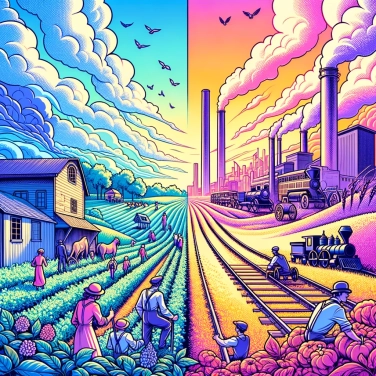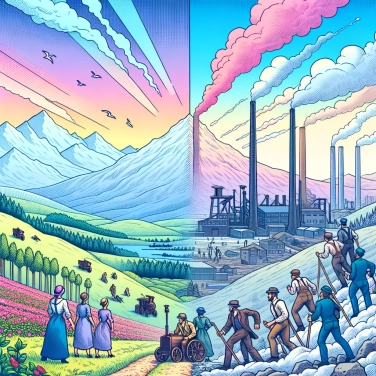The Industrial Revolution radically transformed society by introducing new technologies, promoting urbanization, and changing modes of production, which had an impact on the organization of work and social structure.

The first major invention is undoubtedly James Watt's steam engine. It gave a huge boost to various activities: textiles, transportation, agriculture... The energy provided by steam gradually replaced human or animal power, allowing work to be done faster, better, and especially for much longer. Then came the railroad, which completely broke down traditional borders, enabling the rapid expansion of trade and population movement. Thanks to this, goods and people traveled farther, faster, and at a lower cost.
All of this had direct social consequences: thousands of rural dwellers left the countryside to work in cities, near factories. This completely upheaved living habits and social relations. Traditional artisans who made everything by hand gradually lost their jobs, replaced by workers operating these new machines, which were faster but often difficult to manage. In short, these technological advances boosted productivity but also fundamentally changed the way people live, work, and interact with each other.
The Industrial Revolution completely boosted productivity with the arrival of new inventions like the steam engine and mechanical looms. Before, everything revolved around craftsmanship and small workshops. With factories, everything accelerated: mass production, sustained rhythm, large volumes. The result? A decrease in manufacturing costs, the birth of mass consumption, and the emergence of large industrial tycoons. It also marked the arrival of industrial capitalism, where those with money invested to operate the new machines and multiply profits. In short, a real economic earthquake that would profoundly reshape the industrial and commercial landscape.
Before, society mainly operated with a rigid organization: on one side, the noble landowners or wealthy bourgeois, and on the other side, the peasants and artisans. With the arrival of factories, everything changes suddenly. Many abandon the countryside, moving to the city, and voilà, new social classes are created. We have an industrial bourgeoisie that quickly enriches itself thanks to the factories, mines, and commerce. Opposite them are the workers, increasingly numerous, often poor, living in difficult conditions. The result: wealth gaps widen significantly, disrupting everything, even family habits. Previously, everyone worked at their own pace in small family workshops. Now, it's completely different: imposed fixed schedules, forced labor for children and women, and working-class families crammed into very precarious housing on the outskirts of cities. In short, traditional society completely explodes, making way for a new organization based on social class and wealth generated by industry.
With factories setting up everywhere, people are leaving their countryside in large numbers to look for work in the city: this is called rural exodus. As a result, cities are exploding in size, with a large concentration of population. This marks the beginning of urbanization. Neighborhoods are often haphazardly crammed together, housing becomes tiny, dirty, and poorly ventilated. Naturally, this leads to epidemics, such as cholera, which spread quickly under these conditions. But urban life also brings new habits: living by the factory clock, sometimes enjoying free time to go out to cafés, theaters, or public gardens. This urban dynamism permanently changes daily life and social relationships.
With the arrival of factories, workers toil hard for long hours under often harsh conditions. Tired of having few rights and working for a miserable wage, many begin to demand better working conditions. These workers' demands take shape under the pressure of organized protest groups: this is where the first unions emerge. These associations of workers seek to defend employees against employers by advocating for shorter working hours, better wages, and safety in the factories. Strikes, demonstrations, and protests then animate industrial cities to make the voice of workers heard. This transforms the balance of power, gradually giving rise to new social rights.
The Industrial Revolution marks the beginning of intense pressure on the environment, particularly due to the massive consumption of coal, air pollution from factories, and the transformation of the landscape through rapid urbanization. These changes signal the onset of the modern environmental issues we still face today.
The Industrial Revolution profoundly transformed the world of work by introducing factory labor, which was intensive and repetitive. Traditional craftsmanship declined, replaced by mechanization and a wage-earning workforce that often faced difficult conditions, long hours, and low wages, leading to the emergence of labor movements and trade unionism.
The massive influx into cities leads to explosive population growth often accompanied by health and housing insecurity. In the long term, this results in major societal transformations, such as the emergence of a distinct urban working class, the gradual establishment of public services, and new social interactions profoundly altered by urban daily life.
Faced with difficult working conditions, a lack of regulation, and low wages, workers are beginning to organize to demand better working conditions and greater respect for their rights. In this regard, unionization represents an effective collective means to defend their interests against employers and the government.
The main inventions include James Watt's steam engine, the mechanical spinning and weaving machines, the development of the locomotive and the railway, as well as improvements in steelmaking processes such as the Bessemer process. These innovations enable a spectacular acceleration of industrial production and commercial exchanges.

No one has answered this quiz yet, be the first!' :-)
Question 1/5